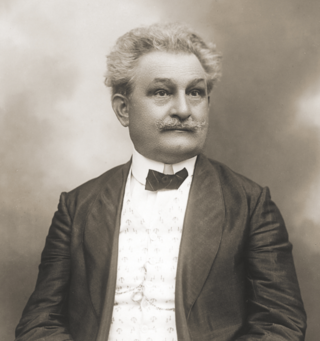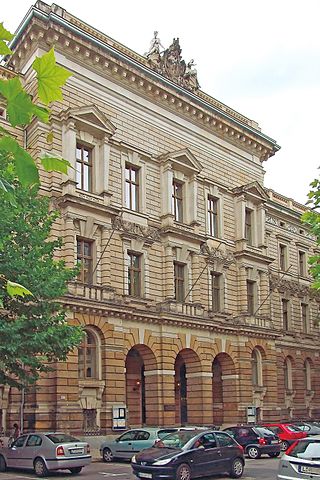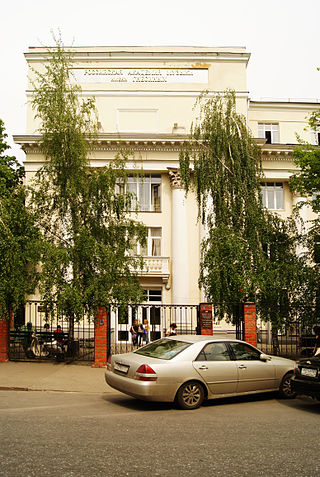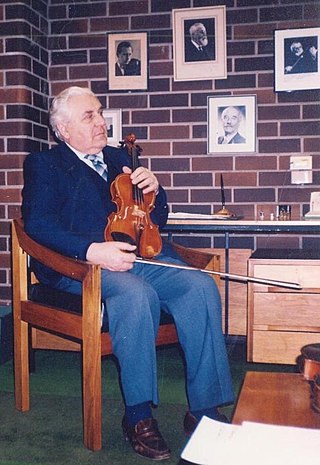Related Research Articles

Leoš Janáček was a Czech composer, music theorist, folklorist, publicist, and teacher. He was inspired by Moravian and other Slavic music, including Eastern European folk music, to create an original, modern musical style.

The Hochschule für Musik Hanns Eisler Berlin in Berlin, Germany, is one of the leading universities of music in Europe. It was established in East Berlin in 1950 as the Deutsche Hochschule für Musik because the older Hochschule für Musik Berlin was in West Berlin. After the death of one of its first professors, composer Hanns Eisler, the school was renamed in his honor in 1964. After a renovation in 2005, the university is located in both Berlin's famed Gendarmenmarkt and the Neuer Marstall.

The University of Music and Theatre "Felix Mendelssohn Bartholdy" Leipzig (German: Hochschule für Musik und Theater "Felix Mendelssohn Bartholdy" Leipzig) is a public university in Leipzig (Saxony, Germany). Founded in 1843 by Felix Mendelssohn as the Conservatorium der Musik (Conservatory of Music), it is the oldest university school of music in Germany.
Karel Husa was a Czech-born classical composer and conductor, winner of the 1969 Pulitzer Prize for Music and 1993 University of Louisville Grawemeyer Award for Music Composition. In 1954, he emigrated to the United States and became an American citizen in 1959.
Chicago Musical College is a division of the Chicago College of Performing Arts at Roosevelt University.
Ladislav Kubík was a Czech-American composer. His style is associated with other post-war Eastern European composers, such as Krzysztof Penderecki and Witold Lutosławski.

Karel Boleslav Jirák was a Czechoslovak composer and conductor.

The Academy of Performing Arts in Prague is a university in the centre of Prague, Czech Republic, specialising in the study of music, dance, drama, film, television and multi-media. It is the largest art school in the Czech Republic, with more than 350 educators and researchers, and 1500 students.

The Gnessin State College of Music and Gnessin Russian Academy of Music comprise a music school in Moscow.

Jaroslav Křička was a Czech composer, conductor, and music teacher. He was the brother of poet Petr Křička[de].

Jan Boleslav Sedivka, Czech-born, was one of Australia's foremost violinists and teachers.

Fitznells Manor is the last surviving manor house in the borough of Epsom and Ewell in Surrey, England. It is a Grade II listed building.
The Mendelssohn Scholarship refers to two scholarships awarded in Germany and in the United Kingdom. Both commemorate the composer Felix Mendelssohn, and are awarded to promising young musicians to enable them to continue their development.
Dorothy Quita Buchanan is a New Zealand composer and teacher.
Reginald Bedford was a Canadian pianist and music educator who was part of a piano duo with Evelyn Eby from 1938 through 1979. He and Eby married in 1948. The duo performed in concert at many venues internationally including Eaton Auditorium in Toronto, Wigmore Hall in London, and The Town Hall in New York City. In 1945–1946 the duo had their own weekly radio program with the Canadian Broadcasting Corporation. In addition to his work as a pianist, Bedford was also organist at the All Saints Cathedral in Halifax, Nova Scotia.
Karel Janovický was a Czech composer, pianist, BBC producer and administrator who lived in the United Kingdom from 1950. He was one of the youngest of the group of European émigré composers who came to live and work in Britain during the 1930s and 1940s to avoid persecution at home.
Percy Turnbull was an English composer and pianist best known for his piano character pieces and songs.
Arthur Alexander was a New Zealand-born pianist, teacher and composer who spent most of his career in the United Kingdom.
References
- ↑ Musical Times, November 1946, p 343
- ↑ Cox, Gordon. Living Music in Schools, 1923-1999 (2018) p 18
- ↑ John Longmire, biography at visitoruk.com
- ↑ National Portrait Gallery
- ↑ Music in Education, November/December 1948)
- ↑ Morrisby, E.F. The role of Jan Sedivka in the development of Australian contemporary string music, Prague Conservatory thesis (1973)
- ↑ Wright, David. Karel Janovický
- ↑ Percy Turnbull, biography at bach-cantatas.com
- ↑ Obituary, 'Ruth Dyson', The Independent, 19 August 1997
- ↑ Musical Times, August 1950, p 321
- ↑ Musical Times, December 1956, p 620
- ↑ Obituary, Vivienne Price, The Guardian, 11 December 2014
- ↑ Fitznells Music School website